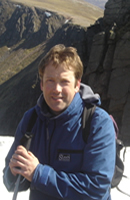Geoforensics and Information Management for crime Investigation (GIMI)
Project Staff - Colin Campbell
 Dr. Colin Campbell BSc, PhD.
Dr. Colin Campbell BSc, PhD.
The Macaulay Land Use Research Institute
Craigiebuckler
Aberdeen AB15 8QH
Scotland, UK
Tel: 01224 395000 Ext 2303
Fax: 01224 395010
e-mail: c.campbell@macaulay.ac.uk
http://www.macaulay.ac.uk/
Current research activities
Colin has 19 years of research experience in soil microbiology/soil science. His expertise lies in fundamental and applied studies on the role of microorganisms in soil, the effects of pollutants e.g. Trends in Pollution of Scottish Soils (TiPSS) and soil health as well as understanding how microbial diversity contributes to ecosystem functioning in natural habitats.
Current projects include studies of the use of microbiological indicators of soil health in different land use systems and the effects of sewage sludge on soil microorganisms to better define Statutory limits for heavy metals. Other projects include the remediation of polluted soils (ACCESS and ENDEGRADE). He is expert in assessing the structure and functioning of soil microbial communities using novel physiological profiling methods that are patented in the UK and US (MicroResp); phospholipid fatty acid analysis and nucleic acid fingerprinting methods. The latter are now being used in studies to investigate their value for forensic investigations of crime scenes (SoilFit). In relation to ecosystem functioning he is interested in the relationships between aboveground plant diversity and soil microbial diversity (MoorCo), the influence of phytochemistry on soil microbes (Probeco) and peatland restoration (RECIPE) He is a member of the steering group for the joint MLURI/Aberdeen University initiative on Soil Health investigating molecular methods for monitoring soil health and has been a participant in several EU and UK Government workshops addressing issues of the sustainable use of soils and the microbiological indicators for soil monitoring. He is a member of the Steering Group appointed by the Irish EPA to oversee the establishment of Ireland's soil monitoring network and soils database. Colin serves on the editorial board of the Journal of Applied Microbiology. He has also undertaken consultancies for commercial companies in areas such as waste treatment and utilisation on land, biorem
Publications
Pine microsatellite markers allow roots and ectomycorrhizas to be linked to individual trees., Saari, S.K., Campbell, C.D., Russell, J., Alexander, I.J. and Anderson, I.C., (2005) New Phytologist, 165, 295-304.
Bacterial diversity promotes community stability and functional resilience after perturbation., Girvan, M.S., Campbell, C.D., Killham, K., Prosser, J.I. And Glover, L.A., (2005) Environmental Microbiology, 7, 301-313.
Assessing shifts in microbial community structure across a range of grasslands of differing management intensity using CLPP, PLFA and community DNA techniques., Grayston, S.J., Campbell, C.D., Bardgett, R.D., Mawdsley, J., Clegg, C., Ritz, K., Griffiths, B., Rodwell, J.S., Edwards, S. J., Davies, W.J., Elston, D.J. and Millard, P., (2004) Applied Soil Ecology, 25, 63-84.
Rock fragments in soil support a different microbial communityfrom the fine earth., Certini, G., Campbell, C.D. and Edwards, A.C., (2004) Soil Biology and Biochemistry, 36, 1119-1128.
Combined microbial community level and single species biosensor responses to monitor recovery of oil polluted soil., Bundy, J.G., Paton, G.I. And Campbell, C.D., (2004) Soil Biology and Biochemistry, 36, 1149-1159.
Colonisation of poplar trees by gfp expressing bacterial endophytes., Germaine, K., Keogh, E., Garcia-Cabellos, G., Borremans, B., van der Lelie, D., Barac, T., Oeyen, L., Vangronsveld, J., Porteous Moore, F., Moore, E.R.B., Campbell, C.D., Ryan, D. and Dowling, D.N., (2004) FEMS Microbiology Ecology, 48, 109-118.

